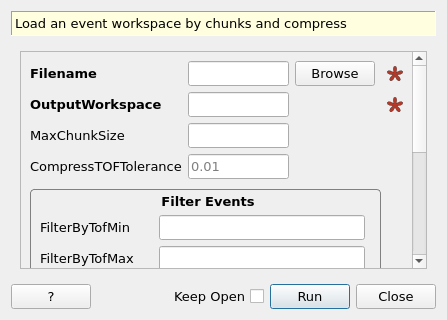\(\renewcommand\AA{\unicode{x212B}}\)
LoadEventAndCompress v1¶

LoadEventAndCompress dialog.¶
Summary¶
Load an event workspace by chunks and compress
See Also¶
Properties¶
Name |
Direction |
Type |
Default |
Description |
|---|---|---|---|---|
Filename |
Input |
string |
Mandatory |
The name of the Event NeXus file to read, including its full or relative path. The file name is typically of the form INST_####_event.nxs (N.B. case sensitive if running on Linux). Allowed extensions: [‘.nxs.h5’, ‘.nxs’, ‘_event.nxs’] |
OutputWorkspace |
Output |
Mandatory |
The name of the output EventWorkspace or WorkspaceGroup in which to load the EventNexus file. |
|
MaxChunkSize |
Input |
number |
Optional |
Get chunking strategy for chunks with this number of Gbytes. File will not be loaded if this option is set. |
CompressTOFTolerance |
Input |
number |
0.01 |
|
FilterByTofMin |
Input |
number |
Optional |
Optional: To exclude events that do not fall within a range of times-of-flight. This is the minimum accepted value in microseconds. Keep blank to load all events. |
FilterByTofMax |
Input |
number |
Optional |
Optional: To exclude events that do not fall within a range of times-of-flight. This is the maximum accepted value in microseconds. Keep blank to load all events. |
FilterByTimeStart |
Input |
number |
Optional |
Optional: To only include events after the provided start time, in seconds (relative to the start of the run). |
FilterByTimeStop |
Input |
number |
Optional |
Optional: To only include events before the provided stop time, in seconds (relative to the start of the run). |
NXentryName |
Input |
string |
Optional: Name of the NXentry to load if it’s not the default. |
|
LoadMonitors |
Input |
boolean |
False |
Load the monitors from the file (optional, default False). |
MonitorsLoadOnly |
Input |
string |
If multiple repesentations exist, which one to load. Default is to load the one that is present. Allowed values: [‘’, ‘Events’, ‘Histogram’] |
|
FilterMonByTofMin |
Input |
number |
Optional |
Optional: To exclude events from monitors that do not fall within a range of times-of-flight. This is the minimum accepted value in microseconds. |
FilterMonByTofMax |
Input |
number |
Optional |
Optional: To exclude events from monitors that do not fall within a range of times-of-flight. This is the maximum accepted value in microseconds. |
FilterMonByTimeStart |
Input |
number |
Optional |
Optional: To only include events from monitors after the provided start time, in seconds (relative to the start of the run). |
FilterMonByTimeStop |
Input |
number |
Optional |
Optional: To only include events from monitors before the provided stop time, in seconds (relative to the start of the run). |
FilterBadPulses |
Input |
number |
95 |
Description¶
This is a workflow algorithm that loads an event nexus file in chunks and compresses the resulting chunks before summing them. It uses the algorithms:
Workflow¶
Usage¶
Example - LoadEventAndCompress
The files needed for this example are not present in our standard usage data download due to their size. They can however be downloaded using these links: PG3_9830_event.nxs.
PG3_9830_event = LoadEventAndCompress(Filename='PG3_9830_event.nxs',
MaxChunkSize=1.)
Example - Usage with MPI
Create a python driver script called test_mpi.py
from mantid.simpleapi import *
import mantid
if AlgorithmFactory.exists('GatherWorkspaces'):
HAVE_MPI = True
from mpi4py import MPI
mpiRank = MPI.COMM_WORLD.Get_rank()
mpiSize = MPI.COMM_WORLD.Get_size()
else:
HAVE_MPI = False
mpiRank = 0 # simplify if clauses
mpiSize = 1 # simplify if clauses
wksp = LoadEventAndCompress(Filename="PG3_2538_event.nxs")
print("Rank = {} Number of Events = {}".format(mpiRank, wksp.getNumberEvents()))
if mpiRank == 0:
reduce = AlignAndFocusPowder(InputWorkspace=wksp, CalFileName='PG3_calibrate_d2538_2014_05_13.cal', Params='0.5,0.01,2')
SaveNexus(reduce,Filename=str(mpiSize)+"tasks.nxs")
And run it using the following commands
$ module load mpi/openmpi-x86_64
$ export LD_PRELOAD=/usr/lib64/openmpi/lib/libmpi.so
$ mpirun -np 8 python test_mpi.py
to run without mpi is simply
$ python test_mpi.py
(you may also need to check out Access Mantid in Python and Notebook)
Categories: AlgorithmIndex | Workflow\DataHandling
Source¶
C++ header: LoadEventAndCompress.h
C++ source: LoadEventAndCompress.cpp
